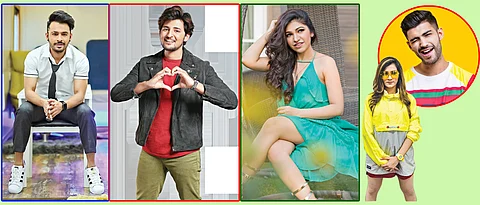

The music scene — both in Bollywood and independent music — is changing drastically. With every film churning out remixes, Indian musicians collaborating with international artists, desi hip hop coming from city slums and Indian rap coming to the fore, the music scene in India is certainly in an interesting phase right now. World Music Day is an ideal day to explore the current trends and find out what’s happening in the music space. To celebrate the day, Vh1 India and MTV Beats along with Facebook will get artists like Zaeden, Darshan Raval, Aastha Gill, SICKFLIP, Tony Kakkar, Su Real, Shahid Mallya, Nikita Gandhi, Tulsi Kumar, and Amit Mishra to jam together for the entire day.
INTERNATIONAL COLLABORATIONS
From Guru Randhawa to Akasa Singh, various Indian artists have collaborated with international talent bringing the world’s focus to our music. Darshan wants to collaborate with John Mayer. The artist who has sung songs like Chogada, Kamariya, Tera Zikr and so on, thinks, it helps reach out to a bigger audience. Singer-composer Tony, popular for songs like Coca Cola Tu, Dheeme Dheeme, Mile Ho Tum, Car Mein Music Baja, Kuch Kuch etc, feels such collaborations give Indian artists great exposure. “This way, music also reaches an international audience. It is beneficial for both Indian artists and non film music, or rather independent music,” he adds.
DJ Zaeden, popular for remixes of Coldplay’s Magic, Maroon 5’s Animals and Don’t Wanna Know, and Justin Bieber’s Love Yourself, had the opportunity to collaborate with some of the best international EDM artists. “In my opinion, collaborations like these have definitely paved the way for India into the global landscape of music. It definitely creates more opportunities for Indian artists to work harder, put quality stuff and get more visibility for international labels,” says he.
Tulsi, who recently sang Tu Laung Main Elaichi in Luka Chuppi, feels it is a great opportunity for Indian music to reach out globally. “When two musicians collaborate, because of the fanbase of each artist, they are able to reach a wider audience. As I always say, music connects people; it helps connect countries and hearts. And these collaborations bring focus to Indian music,” she adds.
Aastha whose groovy tracks with Badshah, DJ Wale Babu and Buzz, are hit party numbers, finds it amazing to see our people work with global sensations. “This way we are introducing our music to the world and making them a part of it. I would love to collaborate with a global music icon as it will help promote Indian independent music,” adds Aastha who wants to work with Beyoncé and Drake.
As for Tony, i would be very unfair to choose one name to collaborate because there are so many great talents out there. “Indian music should reach the audience and international audience is what I believe in more. But if I still had to pick, I would pick Ed Sheeran and Daddy Yankee,” says he.
For Zaeden, it has to be Lauv or The Chainsmokers. “This year marks the debut of some of my first ever live shows as a singer with a full band set up. Both of these artists have really inspired me through live sets and their style of music,” he adds.
SOUNDS FROM GULLY
Gully Boy led to desi hip hop and Indian rap becoming popular in the country. So should Bollywood have more films like these to encourage offbeat music? Tony believes that an artist of Ranveer Singh’s stature working in a film with music as a subject, would definitely promote lesser-known music genres. “I am really happy for Indian hip hop music now because it is getting bigger and getting recognition. I feel more musical films, on different genres should be made so that it reaches a global audience,” he adds.
Zaeden thinks the underground hip hop scene got its due recognition through the film. “I am very happy with the attention it garnered. Bollywood must promote art rather than masala films,” he suggests.
Tulsi believes every genre of music needs to be celebrated and appreciated. “Gully Boy has a totally different kind of music. People didn’t just love the film but also appreciated the music including the raps. I think preference should be given to offbeat music as well and now with singles becoming a big thing, independent music is also becoming more popular,” she adds.
“Although desi hip hop was already there, it was underground and Gully Boy introduced it commercially and in a way that the Indian audience was educated about this genre,” feels Aastha.
REGIONAL MUSIC
While there has been a shift in taste as many are listening to regional music, the number is still very low. “The mainstream music has more platforms as compared to regional music,” says Darshan. When asked how does he think regional music can be given the appreciation it deserves, Zaeden says, “Regional music is not mainstream solely because the language is not necessarily consumer friendly. If people can’t understand the lyrics, they will not connect to the song.”
However, Tony feels that regional music will grow with collaborations. “Both worlds — mainstream and regional — have to come together for it to grow big. I always feel that regional music is much richer and better than our mainstream music. We as one musical family in India, need to support it,” he maintains.
